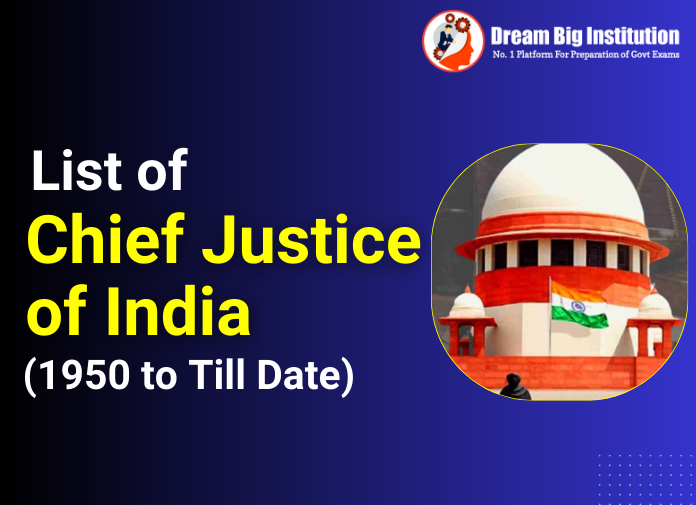Table of Contents
Chief Justice of India List
Chief Justice of India List: Chief Justice of India is the Head of the Supreme Court of India, which is the highest court in India. The Chief Justice of India is responsible for the allocation of cases and appointment of the constitutional benches that deal with the important matters of the law of India The 50th and Current Chief Justice of India is Justice Dhananjaya.Y. Chandarchud who took his oath on 9th November 2022 and his tenure will end on 11th November 2024. Previously, this office was held by U. U. Lalit who became the shortest-served Chief Justice of India.
Chief Justice of India List – Cheif Justice of India Article:
The Supreme Court of India, which is the country’s highest court, is presided over by the Chief Justice of India. The Chief Justice of India is in charge of appointing the constitutional benches that deal with the most important legal matters facing India. The Chief Justice of India List along with the Chief Justice of India article is given below for your reference.
| Chief Justice of India Article | ||
| S.No | Article | Remarks |
| 1 | Article 124 | Appointment of Chief Justice of India |
| 2 | Article 124(3) | Eligibility Criteria of Supreme Court Judges |
| 3 | Article 124(4) | Removal of Supreme Court Judges |
| 5 | Article 125 | Salary of Supreme Court Judges |
Chief Justice of India List – Chief Justice of India Appointment:
The Chief Justice of India and the Judges of the Supreme Court are appointed by the President under clause (2) of Article 124 of the Constitution. The senior Judge of the Supreme Court will be appointed as the Chief Justice of India and considered fit to hold the office. Based on the recommendation of the incumbent chief justice of India for the appointment of the next Chief Justice of India, the Union Minister of Law, Justice, and Company Affairs would decide on the appointment of the new CJI.
Chief Justice of India List – Supreme Court Judge Eligibility Criteria
The eligibility criteria for Supreme Court judges are explained in our Indian Constitution under Article 124. The person has to meet the requirements that are in our constitution. Here we have included the Supreme Court judge eligibility criteria for your reference.
- He/She is a citizen of India and
- has been for at least five years a Judge of a High Court or more such Courts in succession; or
- is, in the opinion of the President, a distinguished jurist.
List of Chief Justice of India (1950- 2024)
Check out the following table to get the complete list of All Chief Justice of India since independence. In the following table, the candidates will find the Chief Justice of India List Name along with their tenure, high courts and Presidents under whom they served.
| Name | Tenure | High Court |
|---|---|---|
| Harilal Jekisundas Kania (1890–1951) | 26th January 1950 To 6th November 1951 | Bombay High Court |
| Mandakolathur Patanjali Sastri (1889–1963) | 7th November 1951 To 3rd January 1954 | Madras High Court |
| Mehr Chand Mahajan (1889–1967) | 4th January 1954 To 22 December 1954 | Lahore High Court |
| Bijan Kumar Mukherjea (1891–1956) | 23rd December 1954 To 31st January 1956 | Calcutta High Court |
| Sudhi Ranjan Das (1894–1977) | 1st February 1956 To 30th September 1959 | Calcutta High Court |
| Bhuvaneshwar Prasad Sinha (1899–1986) | 1st October 1959 To 31st January 1964 | Patna High Court |
| Pralhad Balacharya Gajendragadkar (1901–1981) | 1st February 1964 To 15th March 1966 | Bombay High Court |
| Amal Kumar Sarkar (1901–2001) | 16th March 1966 To 29th June 1966 | Calcutta High Court |
| Koka Subba Rao (1902–1976) | 30th June 1966 To 11th April 1967 | Madras High Court |
| Kailas Nath Wanchoo (1903–1988) | 12th April 1967 To 24th February 1968 | Allahabad High Court |
| Mohammad Hidayatullah (1905–1992) | 25th February 1968 To 16th December 1970 | Bombay High Court |
| Jayantilal Chhotalal Shah (1906–1991) | 17th December 1970 To 21st January 1971 | Bombay High Court |
| Sarv Mittra Sikri (1908–1992) | 22nd January 1971 To 25th April 1973 | Lahore High Court |
| Ajit Nath Ray (1912–2009) | 26th April 1973 To 27th January 1977 | Calcutta High Court |
| Mirza Hameedullah Beg (1913–1988) | 29th January 1977 To 21st February 1978 | Allahabad High Court |
| Yeshwant Vishnu Chandrachud (1920–2008) | 22nd February 1978 To 11th July 1985 | Bombay High Court |
| Prafullachandra Natwarlal Bhagwati (1921–2017) | 12th July 1985 To 20th December 1986 | Gujarat High Court |
| Raghunandan Swarup Pathak (1924–2007) | 21st December 1986 To 18th June 1989 | Allahabad High Court |
| E. S. Venkataramiah (1924–1997) | 19th June 1989 To 17th December 1989 | Karnataka High Court |
| Sabyasachi Mukharji (1927–1990) | 18th December 1989 To 25th September 1990 | Calcutta High Court |
| Ranganath Misra (1926–2012) | 26th September 1990 To 24th November 1991 | Orissa High Court |
| Kamal Narain Singh (1926–) | 25th November 1991 To 12th December 1991 | Allahabad High Court |
| Madhukar Hiralal Kania (1927–2016) | 13th December 1991 To 17th November 1992 | Bombay High Court |
| Lalit Mohan Sharma (1928–2008) | 18th November 1992 To 11th February 1993 | Patna High Court |
| M. N. Rao Venkatachaliah (1929–) | 12th February 1993 To 24th October 1994 | Karnataka High Court |
| Aziz Mushabber Ahmadi (1932–) | 25th October 1994 To 24th March 1997 | Gujarat High Court |
| Jagdish Sharan Verma (1933–2013) | 25th March 1997 To 17th January 1998 | Madhya Pradesh High Court |
| Madan Mohan Punchhi (1933–2015) | 18th January 1998 To 9th October 1998 | Punjab and Haryana High Court |
| Adarsh Sein Anand (1936–2017) | 10th October 1998 To 31st October 2001 | Jammu and Kashmir High Court |
| Sam Piroj Bharucha (1937–) | 1st November 2001 To 5th May 2002 | Bombay High Court |
| Bhupinder Nath Kirpal (1937–) | 6th May 2002 To 7th November 2002 | Delhi High Court |
| Gopal Ballav Pattanaik (1937–) | 8th November 2002 To 18th December 2002 | Orissa High Court |
| Vishweshwar Nath Khare (1939–) | 19th December 2002 To 1st May 2004 | Allahabad High Court |
| S. Rajendra Babu (1939–) | 2nd May 2004 To 31st May 2004 | Karnataka High Court |
| Ramesh Chandra Lahoti (1940–2022) | 1st June 2004 To 31st October 2005 | Madhya Pradesh High Court |
| Yogesh Kumar Sabharwal (1942–2015) | 1st November 2005 To 13th January 2007 | Delhi High Court |
| K. G. Balakrishnan (1945–) | 14th January 2007 To 12th May 2010 | Kerala High Court |
| Sarosh Homi Kapadia (1947–2016) | 12th May 2010 To 28th September 2012 | Bombay High Court |
| Altamas Kabir (1948–2017) | 29th September 2012 To 18th July 2013 | Calcutta High Court |
| P. Sathasivam (1949–) | 19th July 2013 To 26th April 2014 | Madras High Court |
| Rajendra Mal Lodha (1949–) | 27th April 2014 To 27th September 2014 | Rajasthan High Court |
| Handyala Lakshminarayanaswamy Dattu (1950–) | 28th September 2014 To 2nd December 2015 | Karnataka High Court |
| Tirath Singh Thakur (1952–) | 3rd December 2015 To 3rd January 2017 | Jammu and Kashmir High Court |
| Jagdish Singh Khehar (1952–) | 4th January 2017 To 27th August 2017 | Punjab and Haryana High Court |
| Dipak Misra (1953–) | 28th August 2017 To 2nd October 2018 | Orissa High Court |
| Ranjan Gogoi (1954–) | 3rd October 2018 To 17th November 2019 | Guwahati High Court |
| Sharad Arvind Bobde (1956–) | 18th November 2019 To 23th April 2021 | Bombay High Court |
| Nuthalapati Venkata Ramana (1957–) | 24th April 2021 To 26th August 2022 | Andhra Pradesh High Court |
| Uday Umesh Lalit (1957–) | 27 August 2022 To 8 November 2022 | Bar Council |
| D. Y. Chandrachud | 9 November 2022 – Incumbent |
50th Chief Justice of India Current:
- Dhananjaya Yashwant Chandrachud (born 11 November 1959) is an Indian judge who is serving as the 50th and current Chief Justice of India.
- He is a former ex-officio executive chairman of the National Legal Services Authority.
- He is a former chief justice of the Allahabad High Court and a former judge of the Bombay High Court.
- Appointed Judge of the Supreme Court of India on 13 May 2016.
Facts About Previous Chief Justice of India
Here are some interesting facts about the Previous Chief Justices of India. Read through the following section carefully.
- Amal Kumar Sarkar was the longest-lived chief justice of India, he died at the age of 100.
- Kamal Narain Singh, the 22nd chief justice, is the shortest-serving, for 17 days (25 November 1991 – 12 December 1991).
- Yeshwant Vishnu Chandrachud, the 16th chief justice, is the longest-serving chief justice, serving over seven years (February 1978 – July 1985).
- Jagdish Singh Khehar, the 44th chief justice, was the first CJI from the Sikh community.
- Sam Piroj Bharucha, the 30th Chief Justice was the first CJI from the Parsi community.
- Harilal Jekisundas Kania is the shortest-lived chief justice, he died in office at the age of 61.
- Current Chief Justice of India, Justice Dhananjaya.Y. Chandarchud is the son of Yeshwant Vishnu Chandrachud who was the 16th Chief Justice of India.
Chief Justice of High Courts- New Appointment
Kiren Rijiju, the Union Ministry of Law and Justice announced on 12th February 2023 via a Tweet that 4 new Chief Justices have been appointed for different High Courts in across India. As per the tweet, the four Chief Justices are Justice Sonia Giridhar Gokani for Gujrate High Court, Justice Sandeep Mehta for Gauhati High Court, Justice Jaswant Singh for Tripura High Court and Justice N Kotiswar Singh for J-K and Ladakh High Court.
Who will Succeed the Current Chief Justice of India?
Justice Sanjiv Khanna will succeed the Current Chief Justice of India, Justice Dhananjaya.Y. Chandarchud. His Tenure as CJI will extend from 11th November 2024 to 13th May 2025. The Chief Justice of India can easily be predicted until 2027 based on the seniority and eligibility of the current Supreme Court Judges. For Example, Justice Sanjiv Khanna will be succeeded by Justice BR Gavaiand he will be followed by Justice Surya Kant. Next, Justice Vikram Nath will come in followed by Justice BV Nagarathna whose tenure will end on 29th October 2027.
New Chief Justice of India Appointment
The new Chief Justice of India is Justice D.Y. Chandarchud who took his oath in presence of the President of India, Droupadi Murmu on 8th November 2022. Justice Dhananjaya Yashwant Chandrachud was part of the Supreme Court Benches that delivered various landmark verdicts including the Ayodhya land dispute case. His oath ceremony was administered at the Rashtrapati Bhawan.
Chief Justice of India Update
The former Chief Justice of India, U.U. Lalit nominated Justice D.Y. Chandarchud as his successor during a brief meeting held on 11th October 2022. The name was announced in the presence of the justice of the Supreme Court at the Supreme Court Judge’s Lounge. Justice D.Y. Chandarchud will be the 50th Chief Justice of India. The nomination will have been approved by the Government of India. Justice D.Y. Chandarchud’s father Y.V. Chandrachud was the 16th Chief Justice of India and he was one of the longest-serving Chief Justices of India. His tenure was even year long from 22nd February 1978, to 11th July 1985.
Who is the Chief Justice of India?
The Chief Justice of India is the head of the Supreme Court of India along with the judiciary system in India. In other words, the CJI is the highest-ranking officer in the judicial system in India. The CJI is appointed by the President from the Bench of Supreme Court Judges on the basis of their seniority. The CJI is responsible for maintaining the functioning of the Supreme Court such as the appointment of cases, maintaining the roster and so on.
Chief Justice of India Responsibilities
The Chief Justice of India is responsible for various important functioning of the Judicial System of India. Some of the main responsibilities of the CJI are mentioned below.
- The CJI Is responsible for allocating cases of cases to the Supreme Court Judges.
- CJI appoints judicial and constitutional benches to deal with important legal matters.
- The Supreme Court Judges are appointed by the President of India after consultation with the CJI.
- The outgoing CJI often recommends the next appointed CJI to the President as per the seniority principle.
- The CJI appoints other court officials as well
Chief Justice Of India – Sample Question for General Awareness
To better understand the importance of CJI – Chief Justice of India topic for General Awareness section of competitive exams, it is necessary to know the type of questions asked in the examination. Hence, given below are a few Sample Question on the Chief Justice Of India or CJI of Supreme Court for reference.
Q.1. Who was the first Women Judge of Supreme Court of India?
- Ranjana Desai
- Fatima Beevi
- Sujata Manohar
- Gyan Sudha Mishra
Answer (2)
Q.2. The Chief Justice of India holds the office of Supreme Court of India till ___?
- Till he attains the age of 65 years
- Till he attains the age of 62 years
- Till he attains the age of 65 years or 5 years of Tenure whichever is earlier
- Till he attains the age of 62 years or 3 years of Tenure whichever is earlier.
Answer (1)
Q.3. The judge of Supreme Court of India i.e. (CJI) submits his resignation to____?
- Speaker
- The President of India
- Law Minister of India
- Senior Judge of the Supreme Court
Answer (2)
Q.4. The ____ article of the Indian Constitution is related to the establishment and constitution of the Supreme Court of India.
- Article 90
- Article 168
- Article 68 & 69
- Article 124
Answer (4)
Q.5. Justice H J Kania was the first Chief Justice from the Indian soil, who was the first-ever Chief Justice of India who served office before Independence?
- C.D Deshmukh
- Sir Maurice Gwyer
- G.V. Mavlankar
- Sir Robert W Pattrick
Answer (2)
The questions on Chief Justice of India are for your reference to understand the type and variety asked in the exams. Candidates are advised to go through previous years paper for understanding the scope of questions even better.
List of Chief Justice of India: FAQS
Q. Who is the 21st Chief Justice of India?
Ans: Ranganath Mishra (25 November 1926 – 13 September 2012) was as the 21st Chief Justice of India
Q. Who is 47 Chief Justice of India?
Ans: Ramana is 47 Chief Justice of India.
Q. Who was the first Chief Justice of India?
Ans: Harilal Jekisundas Kania was the first Chief Justice of India.













